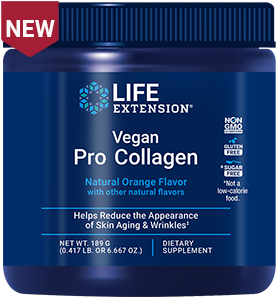
Collagen Powder vs. Capsules: Which Is Best for You?
Published: July 2024
Maybe you've tried using collagen in the past as part of your skin care routine, keeping a jar in your bathroom right next to your hyaluronic acid. Or perhaps you put a scoop of collagen powder in a smoothie with berries and leafy greens. You're not alone. Most of us have read in a magazine or seen on social media that our bodies produce less collagen as we age.
Collagen is a protein—the most abundant protein you've got—and it's a vital support system for many of the tissues in your body. So, while it's great for your skin, hair and nails, it serves other important purposes, too, both inside and out.
But once you start to go down the rabbit hole to learn about collagen, it's easy to get overwhelmed. There are multiple types of collagen, and taking it can be as simple as swallowing a capsule or as elaborate as baking it into a breakfast treat.
Not to worry: we've got the answers. Learn about the various forms of collagen supplements, what ingredients to look out for when selecting a supplement, the benefits of collagen, whether collagen powder is better than capsules and more about this important protein!
Is it better to take collagen powder or capsules?
First, let's tackle one of the bigger questions. Like many supplements, collagen comes in various forms. Should you go for powdered collagen or something in capsule form? Which is better?
Well, it's a trick question: it totally comes down to personal preference! Some people like the convenience of taking collagen capsules with the rest of their supplements, while others like mixing the powder into their protein drinks, coffee or smoothies. Pick the one that works best for you and follow the dosage directions on the product label.
We've got one caveat, though. We don't recommend breaking open a capsule and consuming the contents as a powder. That's not how it was formulated, and also, it wouldn't taste very good. (In other words, this isn't the same as taking a scoop of collagen powder.)
If you do opt for a powdered supplement, there are all sorts of delicious collagen recipes to make it easy to get your daily dosage in. You can easily sneak it into chocolate chip zucchini bread, frosted sugar cookies and even Greek yogurt bowls.
Are you hungry? We're hungry.
Pro tip: Sometimes, collagen is easily confused with gelatin. While the two have commonalities—for instance, they're both proteins—they're not interchangeable, as gelatin is a degraded form of collagen.
What’s in collagen supplements?
Collagen supplements can contain either nutrients that help boost your body's natural production of its own collagen, or actual collagen from animal sources—and animal collagen is available in various forms and types as well. For this reason, the decision to supplement with collagen is actually a lot more complicated than whether to go with a capsule or powder!
Let's get into the forms of collagen you might see on the label of your supplements, as well as their benefits.
Collagen peptides
Collagen peptides, also called hydrolyzed collagen, are taken from traditional collagen—which is going to come from animal sources—and play an important role in skin, joint and nail health. The hydrolysis process breaks down the collagen so your body can more easily use it. For example, in one double-blind study of 69 women between the ages of 35 and 55, participants saw better skin elasticity after just eight weeks of supplementing with hydrolyzed collagen.
Another clinical study showed that women taking bioactive collagen peptides saw a 20% minimization in the appearance of eye wrinkles after eight weeks, in addition to supported skin elastin and healthy collagen levels. Think of collagen peptides as helping moisturize your skin from the inside out.
While the relationship between collagen and nail health hasn't been as closely studied, research has even found that taking bioactive collagen peptides can help maintain your nail growth rate and toughness.
That's not all collagen peptides can do! In yet another randomized study—this time, six months long with 250 subjects—participants demonstrated that a daily intake of hydrolyzed collagen (also known as hydrolysate) significantly promoted knee comfort. Occasional knee discomfort affects around 25% of adults, so supporting joint function and mobility with collagen peptides can ultimately help promote overall quality of life.
Needless to say, if you need some support in the hair, skin, nails or joint department, turn to collagen. Collagen peptides can be found both in the form of a collagen powder or as tablets.
Explore Our Best Collagen Supplements
Procollagen
Procollagen is a precursor of collagen that gives your body the building blocks it needs to create its own collagen. And while many people think that you have to get procollagen from animal products, if you're looking for an alternative to traditional collagen, research has found that vegan procollagen is just as effective. In one double-blind, placebo-controlled study, a vegan procollagen nutrient blend was compared to traditional collagen—in this case, from fish. Both groups saw similar improvements in collagen density, the appearance of wrinkles, and overall skin health and hydration.
Look for procollagen formulas that contain the same amino acid profile as human type I collagen (more on this in a minute!) and are formulated with ingredients like ginseng root, vitamin C and gotu kola extracts to support healthy collagen production in the body.
So, procollagen vs. collagen peptides: which is best for you? In a nutshell, the exact formula you take depends on your goals, preferences, and whether you'd prefer a vegan option or not. But they have all demonstrated their efficacy, so choose what's going to fit your lifestyle best!
What are the different types of collagen?
Earlier, we mentioned type I collagen. While there are technically five main types of collagens, for the purpose of supplementing, we're going to focus primarily on types I-III.
Type I makes up 90% of your body's collagen. It's very densely packed and provides structure to your bones, skin, tendons and ligaments. This is the kind you'll most commonly find in supplements. Type II is found in elastic cartilage, which provides joint support. Type III is found in the skin, muscles, arteries, and organs. These three types make up the majority of the collagen in your body.
Often when you're shopping for a collagen supplement, it will specify the exact type it's made with. For instance, some type II collagen products for joint health will specify that the supplement contains a form of undenatured type II collagen that's identical to what you'd find in your joints.
And while we're on that note, when it comes to type II collagen, research tells us that undenatured is the way to go. It can support joint comfort and knee joint function. In fact, a randomized controlled trial found that undenatured type II collagen supported joint comfort, mobility and function scores by as much as 40% in just 90 days.
Some supplements, like collagen peptide formulas, might even include all three types for comprehensive support.
Collagen: The "Secret" Protein
When we think about getting more protein in our diets, we often turn to chicken, yogurt, dairy and other food sources. However, we have to be intentional about getting enough collagen, specifically.
Ensuring we adequately nourish our bodies as we age is vital to maintaining our wellness. Over time, it becomes harder for our bodies to produce the amount of collagen we need to keep our skin, nails, hair and joints healthy. A small capsule or scoop of powder a day can help keep your collagen levels in an ideal range.
Is it better to take collagen in the morning or at night?
What's most important is following the dosage directions on the product label (or the directions given by your healthcare provider). If there is no time specified, then that means you can take your collagen supplement when it's most convenient for you.
A lot of people choose to take collagen first thing in the morning but taking it later in the day is fine as well. If you choose to consume a powder and you have a protein shake at any point during the day (like before or after a workout), it's common to put a scoop of collagen in with your protein to help you meet your health goals.
But, when it comes down to it, taking collagen in the morning or at night, like taking collagen powder versus capsules, will come down again to your preference and how it best fits into your healthy lifestyle.
Psst: Take our skin care quiz to see what other supplements might keep you feeling young and supple.
References
- Benito-Ruiz P, et al. "A randomized controlled trial on the efficacy and safety of a food ingredient, collagen hydrolysate, for improving joint comfort." Int J Food Sci Nutr. 2009. https://pubmed.ncbi.nlm.nih.gov/19212858/
- Crowley DC, et al. "Safety and efficacy of undenatured type II collagen in the treatment of osteoarthritis of the knee: a clinical trial." Int J Med Sci. October 2009. https://pubmed.ncbi.nlm.nih.gov/19847319/
- Hexsel D, et al. "Oral supplementation with specific bioactive collagen peptides improves nail growth and reduces symptoms of brittle nails." J Cosmet Dermatol. December 2017. https://pubmed.ncbi.nlm.nih.gov/28786550/
- Lin YK, et al. "Oral supplementation of vegan collagen biomimetic has beneficial effects on human skin physiology: A double-blind, placebo-controlled study." Journal of Functional Foods. January 2024. https://www.sciencedirect.com/science/article/pii/S1756464623005558?via=ihub
- Lugo JP, et al. "Undenatured type II collagen (UC-II®) for joint support: a randomized, double-blind, placebo-controlled study in healthy volunteers." J Int Soc Sports Nutr. October 2013. https://pubmed.ncbi.nlm.nih.gov/24153020/
- Proksch E, et al. "Oral intake of specific bioactive collagen peptides reduces skin wrinkles and increases dermal matrix synthesis." Skin Pharmacol Physiol. 2014. https://pubmed.ncbi.nlm.nih.gov/24401291/
- Proksch E, et al. "Oral supplementation of specific collagen peptides has beneficial effects on human skin physiology: a double-blind, placebo-controlled study." Skin Pharmacol Physiol. 2014. https://pubmed.ncbi.nlm.nih.gov/23949208/
- Uyen-Sa DTN, et al. "Increasing Prevalence of Knee Pain and Symptomatic Knee Osteoarthritis." Ann Intern Med. December 2011. https://www.ncbi.nlm.nih.gov/pmc/articles/PMC3408027/
- "Collagen." Cleveland Clinic. May 2022. https://my.clevelandclinic.org/health/articles/23089-collagen
Like what you read?
Please subscribe to get email updates on this blog.










